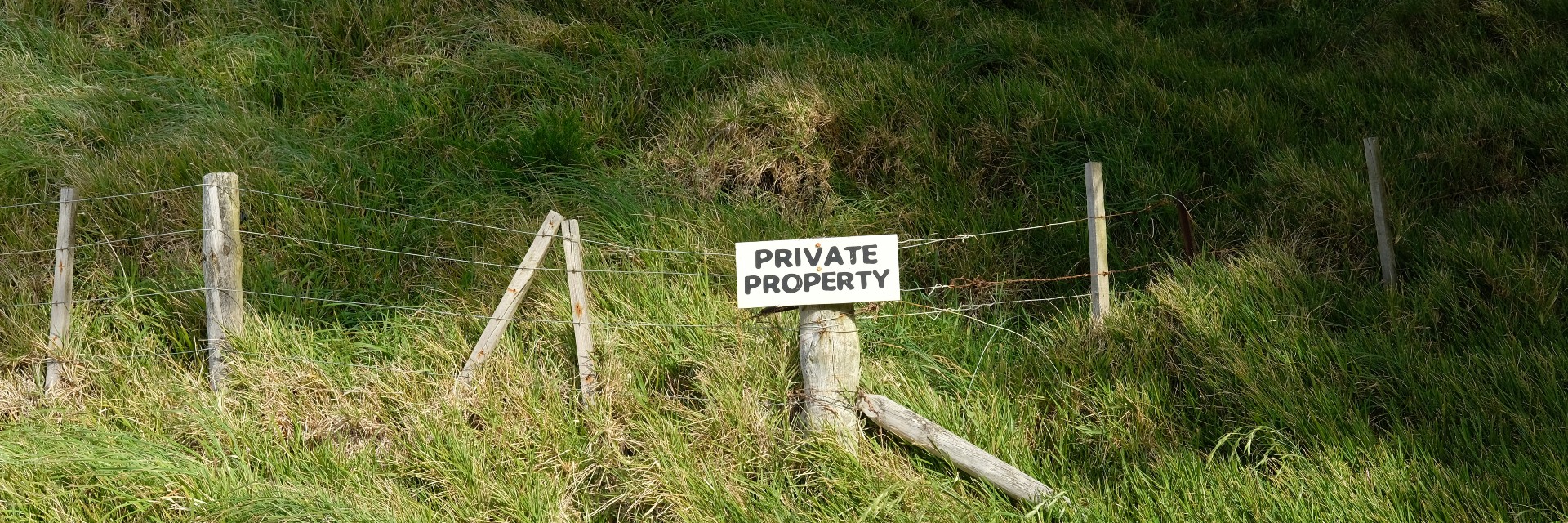Crossing private land
You must get permission from the landholder to cross private land. Follow our advice to help your request go smoothly, and to cross the property responsibly if you’re granted access.
Check our maps if you’re not sure whether a particular section is private. Some public access can look indistinguishable from adjoining private land.
No right to roam: there’s no general right to walk over private land to get to public land in Aotearoa New Zealand. This differs from the ‘Right to Roam’ laws in much of Europe. However, many landholders are happy to grant access to those who ask permission, so long as this generosity is respected.
How to ask for permission to cross private land
A phone call or email is a good place to start. If you cannot find the landholder’s contact details, try a letter and include your contact details with your request.
It’s natural to feel uneasy about requesting access to someone else’s property. Follow these guidelines to help things go smoothly:
- Ask nicely – show courtesy and respect.
- Avoid asking on the day of your trip. Instead, be considerate and ask in advance. This takes the pressure off both you and the landholder.
- Don’t have a firearm with you if you approach the landholder.
- Explain why and where you want to go, and ask if that’s OK.
- Be upfront and clear about any desire to bring dogs or firearms with you.
- For Māori land, you must ask about the relevant tikanga (protocols) to observe.
- Allow the landholder to explain any safety issues and requirements and take note. These are the conditions of your entry.
Hear landholders Joe and Pat discuss allowing access across their property:
How to find contacts for Māori land access requests
Māori land is privately owned land, so the same guidelines above apply when asking for permission to cross it. However, you may need help from the local Māori Land Court and tribal rūnanga to identify property boundaries, owners and appropriate contacts.
If a Māori land trust or incorporation owns the land, they’ll likely be contactable. Visit the Māori Land Court’s mapping website to get helpful information.
Accept refusals with good grace
Landholders have the right to deny access to their land, even if such access has been traditional. Commonly, farmers will deny access during lambing and harvesting times, but often, it comes down to personal preference:
“There are always times when a place changes hands and the new owners won’t allow access. But it also goes the other way – new owners grant access when the old ones weren’t comfortable with it.”
—Anders Crofoot, a landholder and access spokesman for Federated Farmers
We’ve negotiated access solutions to satisfy both landholders and people seeking recreational or cultural access across private land, for example, access to wahi tapu or landlocked properties. Ultimately though, the decision lies with the landholder.
How to cross private land once you have permission
Follow these guidelines to stay safe and to ensure the landholder feels good about letting people cross their property in the future.
Take care with gates and fences
- Leave gates as you find them, open or closed.
- Don’t climb unsupported fence wires — in the absence of a gate or stile, go between the fence wires or climb over at a post.
- Climb over gates at the hinge end, not at the latch end where it could bend or break.
- Don’t obstruct gateways, tracks or entrances.
Protect animals and crops
- Walk in single file around farm animals without driving them.
- Walk around crops rather than through them.
- Do not feed any animals, farmed or wild.
Stick to the plan
- Follow the route and the rules you agreed to with the landholder, such as not firing your gun.
- If you’ve been given permission to bring your dogs, keep them under control appropriately. Pick up and remove their faeces. You may also need to dose them for sheep measles.
Show consideration
- Observe the relevant tikanga on Māori land. You can cause extreme cultural offence by haere pokanoa (unauthorised wandering).
- Follows instructions on signs.
- Do not light fires without permission. If you do light a fire, make sure you fully extinguish it.
- Report damage, livestock in difficulty or anything suspicious to the land manager.
- Take your litter home. Bury toilet waste away from waterways or carry it out.
- Consider thanking the landholder after your trip.
Read the full Outdoor Access Code
Fees and offences
You won’t usually be charged a fee to cross private property. However, the landholder has a right to charge for facilities or services.
If you interfere with a landholder’s rights, you may face penalties under the Trespass Act 1980. Offences include:
- entering private property without permission
- disturbing domestic animals
- setting traps
- shutting an open gate
- opening a closed gate.

